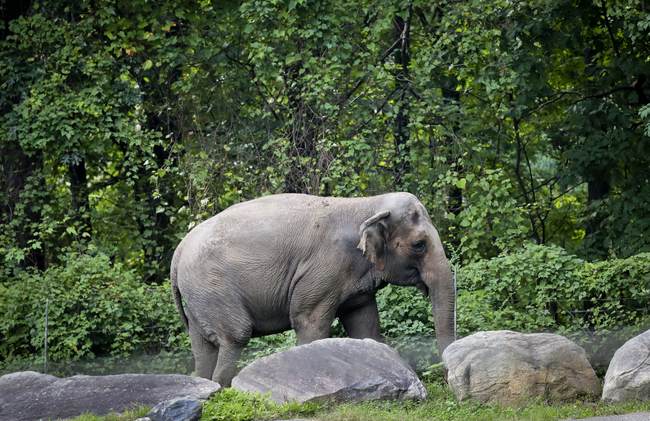
This just in: According to a decision by the Colorado Supreme Court, elephants aren’t human and cannot sue in court.
Now, this seems obvious to most of us, but it isn’t to the animal rights groups that brought the case. Note that it wasn’t the elephants in question, who live in Colorado’s Cheyenne Mountain Zoo, that brought this case; it was humans who brought suit on their behalf. More on that in a moment.
Advertisement
An animal rights group had sought to have the African elephants, Missy, Kimba, Lucky, LouLou and Jambo, freed from Cheyenne Mountain Zoo and moved to an elephant sanctuary, citing a legal process known as “habeas corpus” that allows individuals in custody to challenge their detention or incarceration in court.
The Colorado Supreme Court ruled 6-0 in favor of an earlier district court decision, saying that from a legal standpoint, the question “boils down to whether an elephant is a person.”
“It bears noting that the narrow legal question before this court does not turn on our regard for these majestic animals generally or these five elephants specifically,” State Supreme Court Justice Maria Berkenkotter wrote in her ruling. But, she added, “because an elephant is not a person, the elephants here do not have standing to bring a habeas corpus claim” under Colorado law.
On the surface, this seems like a good decision. Elephants cannot have legal standing because they aren’t humans. Drilling a bit further down, that is due to the fact that humans have rights, but no animals do. Legal protections, yes. Rights, no. All humans have rights. No animals do. That’s why these elephants are not the plaintiffs; an animal rights group made this case, apparently not understanding the fact that they, as humans, had to bring suit was the best argument against their case.
Advertisement
The Nonhuman Rights Project, a U.S.-based animal advocacy organization, had submitted affidavits from seven animal biologists in support of its case. They explained that elephants share numerous cognitive capacities with humans — including self-awareness, empathy, and the ability to learn and communicate. In the wild, elephants travel for many miles each day in complex social groups, the experts said.
Christopher Berry, the executive director for the Nonhuman Rights Project, described the Supreme Court’s judgment as “alarming,” saying that it diminishes the court’s power to “protect the right to liberty when it is violated.”
Yes, elephants are indeed amazing animals: social, intelligent, with deep family bonds. There is evidence that elephants call each other by name. Elephants, like all animals, have legal protection. They should. All animals should. We should not allow animals to be treated callously or cruelly, and we have laws to prevent that. But we should note that those laws only apply to humans. The consequences of breaking those laws only fall on humans. We do not prosecute a wolf for killing a rabbit, but we can prosecute a human for killing a wolf if it’s against the law in a certain jurisdiction.
Advertisement
That’s not an admission that animals have rights. It’s a statement that humans have responsibilities in our dealings with animals. These laws apply to humans. None of them place any responsibility on animals.
See Related: Hero Vet Has Genius Idea of How to Take Care of Pets Stranded by Devastating Palisades Fire
Feel-Good Friday: Dramatic Dog Reunions and the Heroes Who Made It Happen in California Fires
These are not differences in degree. Diminished humans — humans born with serious mental defects, for example — may not have all the rights of all humans. We do not allow people with serious mental impairments to own and use firearms, for instance, the Second Amendment notwithstanding. But they still have rights. No animals do. Not elephants, not apes, not octopi, not mice, not platypuses. This is a difference in kind and remains so until, for example, an elephant, mouse, armadillo, or ape can bring suit itself, without a human or group of humans doing so on its behalf. That’s not likely to happen.
Colorado has gone a bit wacky in the years since I moved there in 1988. But in this case, the Colorado Supreme Court got it right. Elephants are not humans and cannot be treated as humans under the law. If the Nonhuman Rights Project wants to make a case that holds water, let them make a case — if they can — that the elephants in question are being mistreated or abused. Then, they can argue that the animals should be removed from the Cheyenne Mountain Zoo and moved to another setting. They don’t appear to be able to make that case, which is why they relied on the phony habeas corpus argument that brought them to this dead end.
Advertisement
Humans have rights. Animals do not. This ruling further confirms that.
